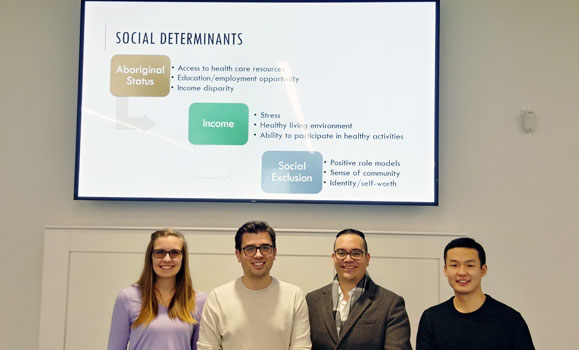News
» Go to news mainMaking things better for Misel: Health Care Team Challenge explores issues faced by Indigenous community

Misel’s grandmother knows something is wrong. It’s like her grandson has become a different person since he turned 13. He’s always been a bright young boy, who excelled at school and in sports – a star player on the local hockey team. Lately though, his coaches and teachers have been reporting disruptive behaviour, and Misel’s grades have deteriorated as a result. And, things are getting worse - Misel has been suffering from abdominal pains that he’s hiding from his grandmother. He knows that she, like a number of others in the small Nova Scotian Mi’kmaq community where they live, is a survivor of the residential school system. How would you help Misel? Which health professionals should be involved in his care? What type of care plan would you recommend?
Simulated patient, real plan
These were the questions faced by four interprofessional teams of Dal Health students, representing 10 programs, at this year’s Health Care Team Challenge (HCTC) on March 6, 2018. Misel is a simulated patient, but the teams were tasked with developing real, actionable collaborative care plans for him that are person and community-centred, based on factors such as his physical exam, medical history and the information provided by his family. At the event, the plans were presented to a panel of judges, including faculty and students from Dalhousie, the NS Health Authority, the IWK Health Centre, and a member of the Indigenous community.
This year marked the fourth annual HCTC held at Dal, but it was the first time the event had looked at a simulated case involving an Indigenous patient. Misel’s case was developed by Dalhousie faculty in collaboration with an Indigenous health educator and researcher, with the goal of raising awareness of the complex health issues facing Indigenous people, including the impacts of inter-generational trauma and social determinants of health. “We feel that interprofessional education is a great opportunity to address health issues for diverse populations” says Noel Pendergast, who is Dal Health’s IPE Coordinator and lead organizer of the HCTC, “and the Indigenous community is one that has some significant health issues, many of which are related to historical factors.”
A two-eyed seeing approach
This year’s winning team, comprised of Katie Alexandre (Occupational Therapy), Remington Shandro (Audiology), Alejandro Gutierrez Ocampo (Health Administration), Guanyong Liu (Kinesiology) and Emma MacDonald (Nursing); took a two-eyed seeing approach to Misel's care, by merging their professional perspectives and training with Indigenous knowledge. This means that Misel’s care plan involves not only his family and a team of health professionals, but the local Indigenous community and Elders. It’s an approach that’s been proven to work in the real world too, with research showing that when interprofessional teams collaborate, with a person/community-centered focus, the result is an improvement in overall care.
While the winning team took home prizes for their efforts, the real takeaways from this event are the lessons students learned from, about and with one another; including a new awareness of the issues that face Indigenous people in our community.
Recent News
- Grad profile: Advocating for culturally responsive care
- Unmasking the ‘Manosphere’: Dal Health researcher explores online radicalization, masculinity and power
- Grad profile: Resilience in action
- Grad profile: Passion for patient‑centered hearing health care
- Grad profile: Advocating for families as a life‑long learner
- Grad profile: Making change through health leadership
- Grad profile: Inspiring through sport and service
- Grad profile: Empowering community through health care
